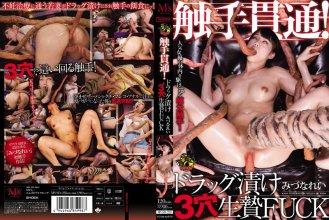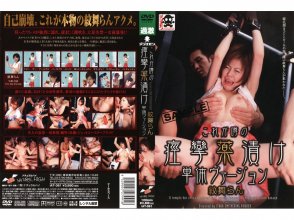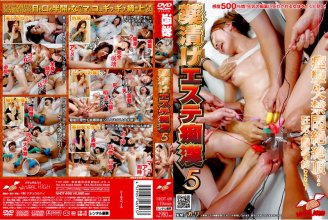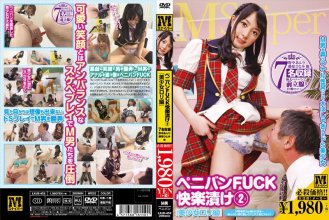Pears, apricots and squid on pita bread...a glossary of frequently mistranslated words in JAV titles
- Thread starter maelstrom9999
- Start date
-
Akiba-Online is sponsored by FileJoker.
FileJoker is a required filehost for all new posts and content replies in the Direct Downloads subforums.
Failure to include FileJoker links for Direct Download posts will result in deletion of your posts or worse.
For more information see this thread.
You are using an out of date browser. It may not display this or other websites correctly.
You should upgrade or use an alternative browser.
You should upgrade or use an alternative browser.
You're going to start seeing this one more and more: Bruise
MOGI-061 A Natural Bruise And A Girl! Non Shirahana (20) Active JD Law Department AV Debut!
View attachment 3024658
HMN-250 Bruises And Cute Spoiled Niece J* And A Lot Of Kisses Creampie Life Cohabitation Ayame Kurumi
View attachment 3024657
STARS-555 [Back-specialized Type] Her Younger Sister's Bruise And Cute Hami Butt Are Too Great ... I've Had A Runaway Assault Piston From Behind! !! !! Yura Kudo
View attachment 3024656
The astute observer will note that it's not just 'bruise', it's always 'bruise and'. The title word in question is あざと [azato], and I'll get to the meaning in a moment. The word for 'bruise' is [aza], and the additive conjunction is [to]. [aza to] = 'bruise and'.
However, [azato] in this sense is 'wily, cunning, or sly; like a gold digger'. The autotranslator makes the mistake because normally that word is in the adjective form あざとい [azatoi]. The word has been around for a while, but has gained more attention in the last few years largely thanks to a popular variety TV show, あざとくて何が悪いの [Azatokute Nani Ga Warui No?] 'What’s Wrong with Being Wily?'. Here's how the TV station describes it:
So these titles are about women who consciously use feminine techniques and strategies, taking advantage of being attractive to get what they want. As the word gains recognition, it's easier to abbreviate it, and the current usage is to combine it with other words. In the examples above, the first one is adjective+noun [Azato-Girl] 'Wily Girl'; the second two are adjective+adjective [azato-kawaii] 'wily-cute'.
Great little post. This got to I think of what in Chinese translation is 狡猾. Typical set up is: two girls A and B are licking guy C's nipples, then B decides foreplay is over and pulls down C's underwear and sucks his cock. Then according to the formula: girl A will say accusatively to B: "[you are] too 狡猾, I too want [to suck] his cock!"
So I search for the keyword and found many many examples all in the same context (sometimes the genders are reversed, say two shotas arguing over the same pussy) but listening to the audio it doesn't sound like あざとい
I'm attaching an MP3 of a few dialog lines, in which "A" says something that sounds like tsurui three times. Would you be kind enough to explain that word? I assume it's a bit more loaded than the literal translation of 狡猾 (cunning).
Attachments
[Bikubiku] as a behavioral trait is as @Electromog says. It can also more directly refer to twitchy & spasmatic motions, which is perhaps more likely in a porn title.
If I were to differentiate between [azatoi] and [zurui]: [zurui] is taking advantage of a situation; [azatoi] is coming into that situation with a plan. Some would say 'tactical' versus 'strategic', perhaps? I don't think anyone's using the word 'tactical' in the middle of cock sucking, though. 'Sneaky' would be a more situationally appropriate way to translate [zurui].
A person can have a flash of inspiration to perform a [zurui] act that they might not normally do. [Azatoi] better describes a pattern of behavior or a personality trait.
[koukatsu] 狡猾 in the Japanese sense is better applied to long term patterns like [azatoi], but that could be more simply connotational rather than part of a dictionary definition. Using a kanji expression like 狡猾 when a more simple adjective like ずるい or あざとい would suffice is something you'd see in literature versus speech (it's also arguably a typically male style of Japanese) -- though all this is of course irrelevant to the Chinese usage as they'd be using the hanzi characters anyway.
==============
More Linguistics Fun: the left side of both characters in 狡猾 (a single vertical stroke with two horizontal strokes, one crossing and one emerging from the vertical) is [kemonohen] けものへん. It is associated directly with dogs and other (frequently predatory) animals; cf. 'cat': 猫 | 'wolf': 狼 | 'fox': 狐 | 'monkey': 猿. I think this is why you also see it in words for certain actions or behaviors that could be called animalistic or predatory; cf 'to r***, to savage': 犯す | 'to become crazed': 狂う | 'to pursue, to aim': 狙う | 'to hunt': 狩る.
The Chinese characters & description you gave were good enough that I didn't even have to listen to the audio -- I did to make sure, though. The word you're hearing translated is [zurui] ずるい (sometimes partially katakana for emphasis: ズルい). It's fine to translate it as 狡猾, if those characters mean the same as they do in Japanese (they would read that word as [koukatsu]). All three - [zurui] & [azatoi] & [koukatsu] - can be translated as 'cunning' among other things.Great little post. This got to I think of what in Chinese translation is 狡猾. Typical set up is: two girls A and B are licking guy C's nipples, then B decides foreplay is over and pulls down C's underwear and sucks his cock. Then according to the formula: girl A will say accusatively to B: "[you are] too 狡猾, I too want [to suck] his cock!"
So I search for the keyword and found many many examples all in the same context (sometimes the genders are reversed, say two shotas arguing over the same pussy) but listening to the audio it doesn't sound like あざとい
I'm attaching an MP3 of a few dialog lines, in which "A" says something that sounds like tsurui three times. Would you be kind enough to explain that word? I assume it's a bit more loaded than the literal translation of 狡猾 (cunning).
If I were to differentiate between [azatoi] and [zurui]: [zurui] is taking advantage of a situation; [azatoi] is coming into that situation with a plan. Some would say 'tactical' versus 'strategic', perhaps? I don't think anyone's using the word 'tactical' in the middle of cock sucking, though. 'Sneaky' would be a more situationally appropriate way to translate [zurui].
A person can have a flash of inspiration to perform a [zurui] act that they might not normally do. [Azatoi] better describes a pattern of behavior or a personality trait.
[koukatsu] 狡猾 in the Japanese sense is better applied to long term patterns like [azatoi], but that could be more simply connotational rather than part of a dictionary definition. Using a kanji expression like 狡猾 when a more simple adjective like ずるい or あざとい would suffice is something you'd see in literature versus speech (it's also arguably a typically male style of Japanese) -- though all this is of course irrelevant to the Chinese usage as they'd be using the hanzi characters anyway.
==============
More Linguistics Fun: the left side of both characters in 狡猾 (a single vertical stroke with two horizontal strokes, one crossing and one emerging from the vertical) is [kemonohen] けものへん. It is associated directly with dogs and other (frequently predatory) animals; cf. 'cat': 猫 | 'wolf': 狼 | 'fox': 狐 | 'monkey': 猿. I think this is why you also see it in words for certain actions or behaviors that could be called animalistic or predatory; cf 'to r***, to savage': 犯す | 'to become crazed': 狂う | 'to pursue, to aim': 狙う | 'to hunt': 狩る.
Last edited:
Bikubiku means being afraid, timid or nervous according to JapanDict.
So then what are those weird variations like mojimojibikubiku and bikubikubaiinbain?
mojimojibikubiku = squirm squirm twitch twitch
bikubikubaiinbain = twitch twitch bounce bounce
bikun bikun = twitch! twitch!
... that reads like some of the worst poetry ever.
bikubikubaiinbain = twitch twitch bounce bounce
bikun bikun = twitch! twitch!
... that reads like some of the worst poetry ever.
I almost want to say it's disappointing, there's no special connotation of ずるい deeper than 狡猾, which BTW in Chinese is precisely the observed (assigned) "personality" of foxes and small predators. On the other hand, you have absolutely flipped on a switch for me! "Sneaky" is so so much better English word than "cunning".[Bikubiku] as a behavioral trait is as @Electromog says. It can also more directly refer to twitchy & spasmatic motions, which is perhaps more likely in a porn title.
The Chinese characters & description you gave were good enough that I didn't even have to listen to the audio -- I did to make sure, though. The word you're hearing translated is [zurui] ずるい (sometimes partially katakana for emphasis: ズルい). It's fine to translate it as 狡猾, if those characters mean the same as they do in Japanese (they would read that word as [koukatsu]). All three - [zurui] & [azatoi] & [koukatsu] - can be translated as 'cunning' among other things.
If I were to differentiate between [azatoi] and [zurui]: [zurui] is taking advantage of a situation; [azatoi] is coming into that situation with a plan. Some would say 'tactical' versus 'strategic', perhaps? I don't think anyone's using the word 'tactical' in the middle of cock sucking, though. 'Sneaky' would be a more situationally appropriate way to translate [zurui].
A person can have a flash of inspiration to perform a [zurui] act that they might not normally do. [Azatoi] better describes a pattern of behavior or a personality trait.
[koukatsu] 狡猾 in the Japanese sense is better applied to long term patterns like [azatoi], but that could be more simply connotational rather than part of a dictionary definition. Using a kanji expression like 狡猾 when a more simple adjective like ずるい or あざとい would suffice is something you'd see in literature versus speech (it's also arguably a typically male style of Japanese) -- though all this is of course irrelevant to the Chinese usage as they'd be using the hanzi characters anyway.
==============
More Linguistics Fun: the left side of both characters in 狡猾 (a single vertical stroke with two horizontal strokes, one crossing and one emerging from the vertical) is [kemonohen] けものへん. It is associated directly with dogs and other (frequently predatory) animals; cf. 'cat': 猫 | 'wolf': 狼 | 'fox': 狐 | 'monkey': 猿. I think this is why you also see it in words for certain actions or behaviors that could be called animalistic or predatory; cf 'to r***, to savage': 犯す | 'to become crazed': 狂う | 'to pursue, to aim': 狙う | 'to hunt': 狩る.
Imagine two kids are eyeing the last piece of mooncake (to be seasonal) if one kid, ignoring decorum, reaches of it first, he might be accused as ずるい, yeah? But in Chinese, that would never be described as 狡猾, nor in English as cunning. He's just oppotunistic, jumping the gun, skipping table manner (whatever). 狡猾 and cunning imply some amount of smart or intricate trickery. In Chinese 狡猾 even carry a hint of malicious, but maybe that's the Confusius thinking (violating manner/ceremony 禮 is bad/evil)
Since we are going down the rabbit hole (fox hole?), it's another topic that I always found fascinating: 変態
I used to think this was a Chinese loanword, but now I'm not too sure, I can imagine it's a loanword from Japan to China. In Japanese it means (almost) anything to do with sex and libido. In Chinese it's NEVER used that way. A man or woman who wants to have sex can be described with various words, some are neutral, many are negative, a few are positive. Most common is 好色, which is approximately lustful. I believe in Chinese 好色 is what Japanese means when they say 変態. But that's very strange!
変態 literally is "change form" or metamorphosis, in biology (butterflies and frogs). There is also 性變態, sexual deviant, in common talk shortened to 變態, which specifically does not include acceptable forms sexual intercourse. Especially homosexuals are not 變態, because anal sex (and oral sex) etc have always been considered morally neutral (if deviant) activities. In Chinese (性)變態 is reserved for criminal/immoral sexual deviation such as pain-as-pleasure (hard S&M), pedophillia, scat, beastiality. I think that makes more sense, "色" (in various combinations) to mean adult (sex), like the X-rated section that can be found in reputable store Don Don Donki ドン・キホーテ, which BTW also sell play-handcuffs (mild S&M not deviant enough to be 變態 in Chinese). For real 變態 you got to get into some creepy scary backstreet shops in certain districts. I am pretty sure even in Japanese there was a time (or still?) 変態 is reserved for something closer to criminal, e.g. train/bus molestor 痴漢.
And then in Japanese you hear even ecchi エッチ to mean just plain normal intercourse. Do I understand correctly that (esp. for under 40 years old) エッチ is the most standard word to express "have sex", "make love", "intercourse", "fuck"? (for those not aware: エッチ etchi is the katanana way to say the Roman letter H, and H is the polite codeword to Hentai (like F is sometimes used to replace "fuck"), the Romanji (as codeword) for 変態 ). I guess when it's a codeword for a codeword it's understandable it has (or not) the original meaning of unhealthy/unlawful sex.
So is there a general word to mean the category of activity/person that is legally/morally unacceptable/unhealthy sex? Or my understanding that 変態 covers both normal and abnormal sex is wrong?
The answer is simple, I think.So is there a general word to mean the category of activity/person that is legally/morally unacceptable/unhealthy sex? Or my understanding that 変態 covers both normal and abnormal sex is wrong?
A prude thinks that even talking about or acknowledging sex is perverted.
A 'normal' person may think that some types of sexual behavior are normal, and some are abnormal.
A person of true sophistication and culture
The only thing that determines perversion, what is 変態 and what is not, is your perspective on what is socially acceptable and what is not.
To circle back to the concept of [azatoi], a person who wants to hide their own knowledge or degree of exposure to sex may hide it by feigning innocence. They'll pretend that anything sexual is perverted; the innocence is a camouflage to hide their own strategic use of sexual provocation.
Or a perfectly normal person might call a perfectly natural behavior [ecchi] or [hentai] to call out someone else's reference to it as out-of-place; social acceptability as defined by setting.
It's important to pay attention to who is using what word, where & when, and to whom. All of these form parts of the word's meaning which can go far beyond a word's definition.
Fun Fact: "H" as an abbreviation for [hentai] has been around since the 60s. The use as a verb for 'to have sex' started in the 80s, and is said to have been the idea of comedian Akashiya Sanma... marking the second time he's appeared in this thread.

Yeah yeah I knew it's a slippery topic. Sure I get the boundary line is relative. Prude vs common standard vs "true sophistication and culture". Like is gambling immoral/illegal? It changes from place to place and time to time.
But the word "immoral" meaning "unacceptable/unwanted" is common to both prude and "culture"m, we just draw the line at different places, but "moral" and "immoral" to express this vs that side of the line is still the same for everyone.
Hmm I am wondering if we are each barking up a different tree... Are you saying the prude perspective is the social norm but often in the pretended and/or ironic sense? I just can't get over that hentai and/or ecchi is appropriate to describe vanilla sex between husband / wife and co-habiting boyfriend / girlfriend.
Like standard high school anime scene: there's a breeze and skirt gets lifted up, the boy peeks and is accused of 変態, come on! For a country that's arguably the #1 porn producer of the whole world.
I find it fascinating because Japanese culture and language is influential to Chinese youth culture, many ACG words are imported (via literal translation and sometimes (comically) phonetic translation). But hentai has absolutely resisted the import. Similar (but less important) 狡猾 also resisted import.
It might be the line between translation/linguistic factor vs. cultural factor. Which does indeed circle back to [zurui] ずるい and あざと [azato].
Normal and healthy libido is called perverted 変態 (same word can be used for scat)
Someone who's oppotunistic and acquire what she wants ahead of other (fairly or not) is called sneaky or cunning ずるい
Someone who uses his/her personal charm to get ahead is called wily あざと
A girl/woman who's good at sports, education, career is called scary (appreciate if you give the correct Japanese word)
These are cultural values, not linguistic matters. Like... I advocate translating お兄/お姉 as onii-chan/onee-chan rather than big brother/sister. Those words are cultural, not linguistic. It's reasonable to demand the reader to learn some minimal cultural facts of Japan rather than spoon-feed them these awkward "big brother" wording.
But the word "immoral" meaning "unacceptable/unwanted" is common to both prude and "culture"m, we just draw the line at different places, but "moral" and "immoral" to express this vs that side of the line is still the same for everyone.
Hmm I am wondering if we are each barking up a different tree... Are you saying the prude perspective is the social norm but often in the pretended and/or ironic sense? I just can't get over that hentai and/or ecchi is appropriate to describe vanilla sex between husband / wife and co-habiting boyfriend / girlfriend.
Like standard high school anime scene: there's a breeze and skirt gets lifted up, the boy peeks and is accused of 変態, come on! For a country that's arguably the #1 porn producer of the whole world.
I find it fascinating because Japanese culture and language is influential to Chinese youth culture, many ACG words are imported (via literal translation and sometimes (comically) phonetic translation). But hentai has absolutely resisted the import. Similar (but less important) 狡猾 also resisted import.
It might be the line between translation/linguistic factor vs. cultural factor. Which does indeed circle back to [zurui] ずるい and あざと [azato].
Normal and healthy libido is called perverted 変態 (same word can be used for scat)
Someone who's oppotunistic and acquire what she wants ahead of other (fairly or not) is called sneaky or cunning ずるい
Someone who uses his/her personal charm to get ahead is called wily あざと
A girl/woman who's good at sports, education, career is called scary (appreciate if you give the correct Japanese word)
These are cultural values, not linguistic matters. Like... I advocate translating お兄/お姉 as onii-chan/onee-chan rather than big brother/sister. Those words are cultural, not linguistic. It's reasonable to demand the reader to learn some minimal cultural facts of Japan rather than spoon-feed them these awkward "big brother" wording.
Queation to the Chinese speakers: is it correct that the JAV subtitles are all in Traditional Chinese charachters? Any particular reason why that is?
The reason behind my question: I am trying to find a good OCR program to detect and recognise hardcoded subs to soft SRTs. And I get different results if I use Simplified, or Traditional OCR models. Funilly enough, sometimes I get more accurate results when I use Simplified language models, but often Traditional language models give better results in general.
Any insight?
The reason behind my question: I am trying to find a good OCR program to detect and recognise hardcoded subs to soft SRTs. And I get different results if I use Simplified, or Traditional OCR models. Funilly enough, sometimes I get more accurate results when I use Simplified language models, but often Traditional language models give better results in general.
Any insight?
Queation to the Chinese speakers: is it correct that the JAV subtitles are all in Traditional Chinese charachters? Any particular reason why that is?
The reason behind my question: I am trying to find a good OCR program to detect and recognise hardcoded subs to soft SRTs. And I get different results if I use Simplified, or Traditional OCR models. Funilly enough, sometimes I get more accurate results when I use Simplified language models, but often Traditional language models give better results in general.
Any insight?
JAVs (I assume not all, but many of the bigger studios are included) are legally licensed and published in Republic of China (Taiwan). The local distributors create commerical grade subtitles and press localised DVD. And slightly redesign the box covers (not that you care).
As far as I know all countries using simplified Chinese are prudes (communist, muslim or Singapore) so that leaves the only source of commercial grade subtitles to be traditional Chinese characters.
I don't know of any serious fansub group (in ANY language), all of them that I've noticed are either individual efforts (i.e. quite rare) or OCR/manual transcribed/manual translated/AI translated from those Taiwan hardsubs. One group does create simplified Chinese hardsub by this path: take the Taiwan hard sub, convert to soft sub, perform machine traditional->simplified conversion, re-mux the simplified Chinese softsub with the vid to generate hardsub. You probably encountered those.
Very recent development is that, according to Chinese JAV fan groups (mostly mainland China) the latest gen of AI voice recognition software (open source or free or free-ish) is getting good enough that it's practical to perform direct audio to (Japanese) text, than machine translation to Chinese softsub and then optionally to hardsub. These are done by mostly mainlanders, so simplified is more standard.
At least, that's my story... I could be wrong.
Last edited:
What vids are you working on? If you can't tell apart simplified vs traditional by sight, is it really worth yourr while to mess around with OCR?Queation to the Chinese speakers: is it correct that the JAV subtitles are all in Traditional Chinese charachters? Any particular reason why that is?
The reason behind my question: I am trying to find a good OCR program to detect and recognise hardcoded subs to soft SRTs. And I get different results if I use Simplified, or Traditional OCR models. Funilly enough, sometimes I get more accurate results when I use Simplified language models, but often Traditional language models give better results in general.
Any insight?
I collect softsubs myself (I don't even know why I do it, I have literally 100x more softsubs than JAVs) and I'm WAY TOO LAZY to mess around with OCR and AI and all that stuff. I mean... I'm even a tech geek in my day job. Way back then I did manual hardsub->softsub for like... 3 or 4 titles? Man that's three too many already.
Better off just obtain softsubs by begging and leeching.
What vids are you working on? If you can't tell apart simplified vs traditional by sight, is it really worth yourr while to mess around with OCR?
I collect softsubs myself (I don't even know why I do it, I have literally 100x more softsubs than JAVs) and I'm WAY TOO LAZY to mess around with OCR and AI and all that stuff. I mean... I'm even a tech geek in my day job. Way back then I did manual hardsub->softsub for like... 3 or 4 titles? Man that's three too many already.
Better off just obtain softsubs by begging and leeching.
Haha -- I like your suggestion
I wanted to learn python and ML, so it is an opportunity for me to do my own sub creation to learn the craft. I have played around with direct audio transcription, and with hardsub OCR.
The latest OCRs that I was trying to tackle are all from Sehuatang hardsubs: MVSD-517, STARS-655, STARS-676, MIAA-675. I encountered the latest dilemma with traditonal vs. simplified chinese when I tried to use a new (to me) tool called paddlepaddle --the one by Baidu and the PaddleOCR, which is supposed to be quite good. I noticed that it some areas it missed the characters --mis-recognises the character. I noticed the ones that are mis-recognised are all traditional characters. Otherwoise it does quite a good job.
150 occurrences of "slurp." The words "slurpy" or "slurping" seem to be connected to blow jobs. Slurp I'm not so sure.
On that last one, if they are saying the "small devil girl" is bullying some guy by sucking him off, then I have to say that bullying has come a long way since I was in school. Having your knob polished is so much more civilized than getting the crap kicked out of you. Maybe it's just a cultural thing.
IPX-279 A Middle-aged Favorite Literature It Is Slurp Thoroughly Thoroughly In A State Where I Can Not Move With My Older Sister. Sakuraba Momomo
ONIN-039 The Line Of The Body Is Perfectly Laid Out The Girl In The Wearing Appearance Wearing The Sweat Slurp Is Put Down And Pounds The Piston To The Ass Of The Mugwort! |
DNJR-082 Like M Guys! W Small Devil Girl Who Bullies A Masochist Man With A Slurp ○ Ruru Arisu. Mei Mitsuki
On that last one, if they are saying the "small devil girl" is bullying some guy by sucking him off, then I have to say that bullying has come a long way since I was in school. Having your knob polished is so much more civilized than getting the crap kicked out of you. Maybe it's just a cultural thing.
Last edited:
I'm leaning toward a complete auto-translate failure there. It's possible to identify which part of each title becomes 'slurp' by process of elimination, but it's a completely different word (or partial word) in each of those three, and none of them have much to do with slurping at all.150 occurrences of "slurp." The words "slurpy" or "slurping" seem to be connected to blow jobs. Slurp I'm not so sure.
IPX-279 A Middle-aged Favorite Literature It Is Slurp Thoroughly Thoroughly In A State Where I Can Not Move With My Older Sister. Sakuraba Momomo
DNJR-082 Like M Guys! W Small Devil Girl Who Bullies A Masochist Man With A Slurp ○ Ruru Arisu. Mei Mitsuki
On that last one, if they are saying the "small devil girl" is bullying some guy by sucking him off, then I have to say that bullying has come a long way since I was in school. Having your knob polished is so much more civilized than getting the crap kicked out of you. Maybe it's just a cultural thing.
The word that shows up the most in "slurp" titles and makes the most sense as 'slurp' is not in any of those three : 丸呑み [marunomi], which means 'to swallow whole' and is indeed used for a lot of blowjob-focused videos.
Great thread. I didn't see this posted yet, and it took me a while to figure out myself:
主観 is often translated as subjectivity. But it means POV.
漬け I don't think it means addicted. It means to drench or cover it with. A popular quick eat in Japan is お茶漬け, which is tea poured over leftover rice with some topping. I guess the difference between 漬け and ぶっかけ is the amount. With the former being less and latter being lots and lots.
主観 is often translated as subjectivity. But it means POV.
漬け I don't think it means addicted. It means to drench or cover it with. A popular quick eat in Japan is お茶漬け, which is tea poured over leftover rice with some topping. I guess the difference between 漬け and ぶっかけ is the amount. With the former being less and latter being lots and lots.
生ハメ does indeed mean raw-fuck, aka unprotected sex. 生 (nama) is Japanese always means raw/no condom. ハメ(hame) means fuck in this instanceUsing an old technique of randomly splitting kanas, I figure out the part of the title is "生ハメを" trying to find a Japanese explanation for 生ハメを is kinda hopeless, maybe someone fluent in Japanese can help. Best I can tell, the string "生ハメ" appears many many times in JAV title, but not much else. The best translation is just raw-fuck (verb).
Last edited:
So that's what subjectivity means, POV. Always wondered as it not only appears in titles but is also a javlibrary genre tag.
Good to point that out, definitely belongs in this glossary!Great thread. I didn't see this posted yet, and it took me a while to figure out myself:
主観 is often translated as subjectivity. But it means POV.
漬け I don't think it means addicted. It means to drench or cover it with. A popular quick eat in Japan is お茶漬け, which is tea poured over leftover rice with some topping. I guess the difference between 漬け and ぶっかけ is the amount. With the former being less and latter being lots and lots.
Context is important here. The most common uses of 漬け in JAV titles involve illicit drugs, aphrodisiacs, or more abstract habit-forming things like pleasure or sex itself:








I'm not super hip on the drug scene, but I'm pretty sure you don't use drugs by pouring them on. For most cases, I stand by the 'addiction' translation, as well as the explanation I gave about pickling.
Which is not to say that there are no cases where 'addiction' is incorrect:

But the majority of JAV titles using 漬け are referring to drugs or other forms of addiction.
===============
I came across kimeseku a lot when searching for those titles. キメセク [kimeseku] is an abbreviation of [kimeru] (キメる or 極める) + sex, and it means 'sex while using drugs'. The drugs in question are usually stimulants (or quote-unquote "aphrodisiacs"); sometimes shown as pills or drops/tinctures, but some of the darker titles may use fake syringes.


 <Our friend DQN makes an appearance here, too
<Our friend DQN makes an appearance here, too
Last edited:
I forgot to address the drug part. Context does matter, and I think in this case it means they're drenched in drug. As in, they've been drugged. A lot of them have themes that are aphrodisiac related (媚薬漬け) where the woman is normally not so slutty, but after the drug, they've turned into a slut. I'd go with that interpretation. But neither of us are native speakers, so I'm not going to insist lol. If I see better evidence to prove or disprove my interpretation in the future, I'll be sure to update the thread so we can get better translations.Context is important here. The most common uses of 漬け in JAV titles involve illicit drugs, aphrodisiacs, or more abstract habit-forming things like pleasure or sex itself:
I'm not super hip on the drug scene, but I'm pretty sure you don't use drugs by pouring them on. For most cases, I stand by the 'addiction' translation, as well as the explanation I gave about pickling.
Hmm. It's valid to draw a distinction between someone who has been drugged VS someone already addicted to something as a drug. I haven't watched the titles I posted to see exactly how the storylines play out. The most common trope I have seen is where someone, willingly or unwillingly, is made to become desirous of the drug; that is, to be addicted as a passive voice verb rather than as a past participle.I forgot to address the drug part. Context does matter, and I think in this case it means they're drenched in drug. As in, they've been drugged. A lot of them have themes that are aphrodisiac related (媚薬漬け) where the woman is normally not so slutty, but after the drug, they've turned into a slut. I'd go with that interpretation. But neither of us are native speakers, so I'm not going to insist lol. If I see better evidence to prove or disprove my interpretation in the future, I'll be sure to update the thread so we can get better translations.
The word that more directly translates to 'drenched' in the same sense as ぶっかけ [bukkake] is probably まみれ [mamire]. (Though I don't recommend searching for that in JAV unless you want to see a bunch of scat titles.
It actually looks like the problem with this glossary which has arisen several times already in this thread is when folks take words to mean one thing and one thing only. Any dictionary worth the paper it's printed on (or the kilobytes it's comprised of) will acknowledge that the same sequence of letters might mean one thing in one place, and another thing in another.
Hmm. It's valid to draw a distinction between someone who has been drugged VS someone already addicted to something as a drug. I haven't watched the titles I posted to see exactly how the storylines play out. The most common trope I have seen is where someone, willingly or unwillingly, is made to become desirous of the drug; that is, to be addicted as a passive voice verb rather than as a past participle.
The word that more directly translates to 'drenched' in the same sense as ぶっかけ [bukkake] is probably まみれ [mamire]. (Though I don't recommend searching for that in JAV unless you want to see a bunch of scat titles.) To contrast, 漬け is closer to 'permeate' - even in the example of お茶漬け, since the tea doesn't just sit on the surface of the rice, but soaks it through.
It actually looks like the problem with this glossary which has arisen several times already in this thread is when folks take words to mean one thing and one thing only. Any dictionary worth the paper it's printed on (or the kilobytes it's comprised of) will acknowledge that the same sequence of letters might mean one thing in one place, and another thing in another.
I can tell you from experience of watching numerous videos on this topic, that 1) the most common association with this word is with aphrodisiacs, 2) the aphrodisiacs are nearly always given without consent.
Similar threads
- Replies
- 132
- Views
- 53K
- Replies
- 109
- Views
- 53K
- Replies
- 127
- Views
- 39K
- Replies
- 883
- Views
- 381K


